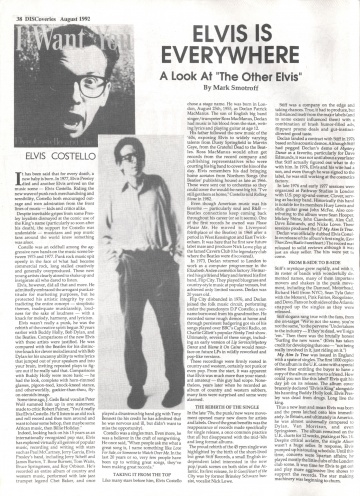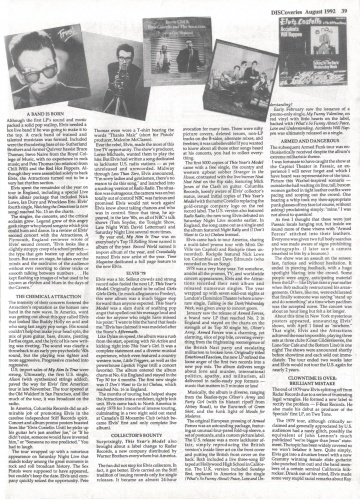|
It has been said that for every death, a new baby is born. In 1977, Elvis Presley died and another Elvis arrived on the music scene — Elvis Costello. Riding the new wave of punk rock merchandising and sensibility, Costello both encouraged outrage and won admiration from the front lines of music — kids and critics alike. Despite inevitable gripes from some Presley loyalists dismayed at the comic use of the King's name (particularly so soon after his death), the support for Costello was undeniable — musicians and pop music fans around the world knew something was afoot.
Costello was an oddball among the aggressive new bands on the music scene between 1975 and 1977. Punk rock music spit openly in the face of what had become commercial rock, long stalled creatively and generally overproduced. These new young artists clearly aimed to shake up and invigorate all who dared to listen.
Elvis, however, did all that and more. He admittedly embraced the arrogant punk attitude for marketing purposes, but he protected his artistic integrity by contradicting the entire concept — simplistic themes, inadequate musicianship, loudness for the sake of loudness — with a knack for melody, harmony, and lyricism.
Elvis wasn't really a punk, he was the rebirth of the creative spirit begun 30 years earlier with Buddy Holly, Bob Dylan, and the Beatles. Comparisons of the new Elvis with these artists were justified. He was compared with the Beatles for his distinctive knack for clever melodies and with Bob Dylan for his uncanny ability to write lyrics that jumped out of your speakers and into your brain, inviting repeated plays to figure out if he really said that. Comparisons with Buddy Holly were more basic — he had the look, complete with horn-rimmed glasses, pigeon-toed, knock-kneed stance, and otherworldly, geekier-than-thou, fly-on-steroids image.
Some time ago, J. Geils Band vocalist Peter Wolf summed him up in one statement, made to critic Robert Palmer, "You'd really like Elvis Costello. He'll listen to an old rock and roll record and then turn around and want to hear some bebop, then maybe some African music, then Billie Holiday."
Indeed, looking back on his 15 years as an internationally recognized pop star, Elvis has explored virtually all genres of popular music, recording and writing with stars such as Paul McCartney, Jerry Garcia, Elvis Presley's band, including Jerry Scheff and James Burton, T. Bone Burnett, Tom Waits, Bruce Springsteen, and Roy Orbison. He's recorded an entire album of country and western music, performed with late jazz trumpet legend Chet Baker, and once played a disastrous big band gig with Tony Bennett (to his credit he has admitted that he was nervous and ill, but didn't want to miss the opportunity).
Costello was a singles man. Even more, he was a believer in the craft of songwriting. He once said, "When people ask me what a great song is, I name something like 'Love For Sale,' or 'Someone to Watch Over Me.' In the last 20 years or so, very few people have been up to writing great songs, they've been making great records."
Taking it from the top
Like many stars before him, Elvis Costello chose a stage name. He was born in London, August 25th, 1955, as Declan Patrick MacManus. The son of English big band singer/trumpeter Ross MacManus, Declan had music in his blood from the start, writing lyrics and playing guitar at age 12.
His father followed the new music of the '60s, exposing Elvis to widely varying talents from Dusty Springfield to Marvin Gaye, from the Grateful Dead to the Beatles. Ross MacManus would often get records from the record company and publishing representatives who were courting his big band to cover the hits of the day. Elvis remembers his dad bringing home acetates from Northern Songs (the Beatles' publishing house) as late as 1966. These were sent out to orchestras so they could cover the would-be next big hit. "I've still got them at home," Costello told Rolling Stone in 1982.
Even though American music was his favorite — particularly soul and R&B — Beatles connections keep coming back throughout his career (or so it seems). One of the first records he owned was "Please Please Me." He moved to Liverpool (birthplace of the Beatles) in 1968 after a period in West Kensington and East Twickenham. It was here that he first saw future label mate and producer Nick Lowe play at the famed Cavern Club (the legendary club where the Beatles were discovered).
In 1973, Declan returned to London to work as a computer programmer in the Elizabeth Arden cosmetics factory. He married his girlfriend Mary and formed his first band, Flip City. They played bluegrass and country-style music at popular venues, but achieved only limited success. Declan was 20 years old.
Flip City disbanded in 1976, and Declan joined the folk music circuit, performing under the pseudonym D.P Costello; a surname borrowed from his grandmother. He recorded some rough demos at home and through persistent badgering got six of his songs played over BBC's Capitol Radio, on Charlie Gillett's popular Honky Tonk show. Ultimately, several of these songs, including an early version of "Lip Service"/"Mystery Dance" and "Blame it On Caine" would resurface on future LPs in wildly reworked and pop-like versions.
These recordings were firmly rooted in country and western, certainly not punk or even pop. From the start, it was apparent that Elvis was much more than your standard amateur — this guy had scope. Nonetheless, years later when he recorded an album of country and western robbers, many fans were surprised and some were alarmed.
The rebirth of the single
In the late '70s, the punk/new wave movement opened many new doors for artists and labels. One of the great benefits was the reappearance of records made specifically for single release, a once common practice that all but disappeared with the mid-'60s and long format albums.
The proud rebirth of the 45 rpm single was highlighted by the birth of the short-lived but great Stiff Records, a small English independent label interested in the new pop/punk scenes on both sides of the Atlantic. Its first release, "So It Goes"/"Heart of the City" was by former Brinsley Schwarz bassist, vocalist Nick Lowe.
Stiff was a company on the edge and taking chances. True, it had to produce, but it distanced itself from the major labels (and to some extent influenced them) with a combination of brash humor-filled ads, flippant promo deals and gut-instinct-directed good taste.
Declan landed a contract with Stiff in 1976 based on his acoustic demos. Although Stiff had pegged Declan's demo of "Mystery Dance" as a favorite, particularly for Dave Edmunds, it was not until about a year later that Stiff actually figured out what to do with him. In 1976, Elvis and his wife had a son, and even though he was signed to the label, he was still working at the cosmetics factory.
In late 1976 and early 1977 sessions were organized at Pathway Studios in London with U.S. pop up-and-comer, Clover, serving as backup band. Historically this band is notable for its members Huey Lewis and slide guitar great John McFee. Also contributing to the album were Sean Hooper, Mickey Shine, John Ciambotti, Alex Call, Dave Edmunds, and Nicke Lowe. These sessions produced the LP My Aim Is True. Declan was officially dubbed Elvis Costello on release of the album's first single, ("Less Than Zero"/"Radio Sweetheart"). The record was released to solid reviews although it was just an okay seller. The hits were yet to come.
From B-side to B-side
Stiff's mystique grew rapidly, and with it, its roster of bands with wonderfully demented names, many of them important movers and shakers in the punk movement, including the Damned, Motorhead, Richard Hell (from NYC), Sean Tyla (later with the Motors), Pink Fairies, Roogolator, and Devo. Fans on both sides of the Atlantic snapped up the singles as they were released.
Stiff slogans rang true with the fans, from the on-target "We're not the same, you're not the same," to the perverse "Undertakers to the industry — If they're dead, we'll sign 'em." Then there was the brutally honest "Surfing the new wave." (Elvis has taken credit for developing that one — "not being really involved in it, just riding on it.")
My Aim Is True was issued in England with a spate of singles. The first 1000 copies of the album in the U.K. came with a special sleeve liner entitling the buyer to have a copy of the album sent free to a friend. How could you not like this label? Elvis quit his day job on its release. The album cover brazenly declared "Elvis is King" alongside his haunting Buddy Holly look. Elvis Presley was dead from drugs. Long live the king.
Thus a new lean and mean Elvis was born and the press latched onto him immediately. In Britain, and ultimately in America, he was almost universally compared to Dylan, Van Morrison, and even Springsteen. The album remained on the U.K. charts for 12 weeks, peaking at No. 14. Despite critical acclaim, the single "Alison" wasn't a huge seller. In response, Elvis pumped up his touring schedule. Until this time, concerts were Spartan affairs; he played mostly the little clubs of the London club scene. It was time for Elvis to get out and play more aggressive live shows to support the records. The star making machinery was beginning to churn.
|

